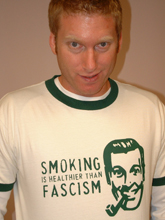|
Now,
if it's true that a smoker will die younger, isn't this money in
the bank? Smokers could in fact save the system from
bankruptcy by paying a lot(3) and not using the services,
leaving beds in hospital for old "healthy" people. Also, if
a large proportion of the voters and many politicians wish to
have socialized medicine (whatever the reasons are), then
they should not complain about paying for it. Isn't this what
"solidarity" means?
Some weeks ago the Quebec
government mentioned they could impose a new tax on every
bottle of sodas to pay for the Montreal Olympic
Stadium's maintenance. The French government is currently
working to impose new nutritional requirements to the fast
food industry. All companies that would not follow the new
rules would not be able to promote their products trough TV,
magazines and other medias. Recently, a politician in Ontario
recommended that beer and wine companies selling in Canada
should have caution labels on every bottle they sell. All
those measures were imposed on the tobacco industry to
reduce smoking.
The pattern is clear: you
give one inch to the State and it takes a mile. All
those laws restricting individual and commercial freedom
are voted by politicians in "free and democratic" societies.
Could democracy only be two wolves and one sheep voting for
dinner?
In a free society, the
state does not regulate peaceful economic transactions,
even when the transaction concerns "risky" products such as
alcohol, cigarettes and drugs. In a free society, the
government doesn't tell bar owners they can no longer
welcome smokers as costumers. In a free society, the law
recognizes bars, restaurants, hotels and clubs as
privately owned businesses, not as "public places."
Unfortunately, recent
history has shown that the fight against tobacco is a top
priority for many governments of western countries. Smokers and business
owners that are threatened by the Quebec law – and
non-smokers who disagree with the law – should try to
resist as much as they can by doing small things. Two of
them could be (1) to buy this great Smoking is healthier
than fascism t-shirt from
bureaucrash and (2) register on line to
mychoice.ca
/ monchoix.ca and become a member of one of the only
groups dedicated to smokers' freedom.
|



